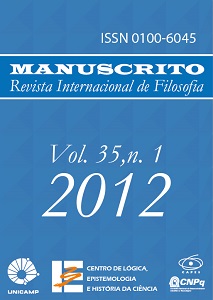Abstract
Segundo a caracterização padrão da lógica nos escritos fregeanos, a palavra “verdadeiro” indica a essência da lógica, assim como a palavra “bom” indica a essência da ética e a palavra “belo” a essência da estética. Num escrito póstumo de 1915, porém, Frege afirma que é a força assertórica, e não a palavra “verdadeiro”, que indica a essência da lógica. Prima facie, esta correção está em conflito com a crítica fregeana à concepção psicologista da lógica. Pois, segundo esta crítica, a lógica não é a ciência das leis “do ser tomado como verdadeiro”, mas a ciência das leis “do ser verdadeiro”, ao passo que a força assertórica expressa o ser tomado como verdadeiro. Em escritos anteriores, tentei resolver este conflito por uma reconstrução da concepção fregeana da verdade baseada na tese fregeana de que verdade é expressa na linguagem natural pela “forma da sentença assertórica”. A meta do presente trabalho é defender esta interpretação contra as objeções recentemente feitas por Marco Ruffino.
Abstract:
According to the standard characterization of logic in Frege’s writings, the word “true” indicates the essence of logic, as the word “good” indicates the essence of ethics and the word “beautiful” the essence of aesthetics. In a posthumous writing from 1915, however, Frege says that it is the assertoric force, and not the word “true”, which indicates the essence of logic properly. Prima facie, this correction is in conflict with Frege’s criticism of the psychologist conception of logic. For according to this criticism, logic is not the science of the laws of “being taken as true”, but the science of the laws of “being true”, while the assertoric force expresses being taken as true. In previous writings, I tried to resolve this conflict by a reconstruction of Frege’s conception of truth that is based on his thesis that truth is expressed in natural language by the “form of the assertoric sentence”. The goal of this paper is to defend this interpretation against the objections recently made by Marco Ruffino.
Keywords: Frege. Essence of logic. Truth. Assertoric force.
References
ANGELELLI, I. Kleine Schriften. Hildesheim/Zürich/New York: Olms, 1990.
BEANEY, M., RECK, E. Gottlob Frege: Critical Assessments of Leading Philosophers, vol. II, Frege’s Philosophy of Logik. London: Routledge, 2005.
DUMMETT, M. Frege: Philosophy of Language. London: Harper and Row, 1973.
DUMMETT, M. The Interpretation of Frege’s Philosophy. Cambridge: Harvard University Press, 1981.
FREGE, G. Begriffsschrift, eine der arithmetischen nachgebildete Formelsprache des reinen Denkens. Halle: Louis Nebert, 1879. Em: G. Frege, Begriffsschrift und andere Aufsätze, Hildesheim/Zürich/New York: Olms, 1988.
FREGE, G. Funktion und Begriff. Jena: Hermann Pohle, 1891. Em: Angelelli (ed) (1990), pp. 125–42.
FREGE, G. Grundgesetze der Arithmetik. Begriffsschriftlich abgeleitet, vol. 1. Jena: Hermann Pohle, 1893. Reprodução: Darmstadt: Wissenschaftliche Buchgesellschaft, 1962.
FREGE, G. “Der Gedanke. Eine logische Untersuchung”. Beiträge zur Philosophie des deutschen Idealismus 1, 1918a. Em: I. Angelelli (ed) (1990), pp. 58-77.
FREGE, G. “Die Verneinung. Eine logische Untersuchung”, Beiträge zur Philosophie des Deutschen Idealismus 1, 1918b. Em: I. Angelelli (ed) (1990), pp. 362–378.
FREGE, G. 1976, Wissenschaftlicher Briefwechsel, vol. I, ed. por G. Gabriel, H. Hermes, F. Kambartel, Ch. Thiel e A. Veraart, Hamburg: Meiner.
FREGE, G. 1983. Nachgelassene Schriften und Wissenschaftlicher Briefwechsel, vol. I, ed. por H. Hermes, F. Kambartel and F. Kaulbach, seg. edição, Hamburg: Meiner.
GREIMANN, D. “The Judgement-Stroke as a Truth-Operator: A New Interpretation of the Logical Form of Sentences in Frege”s Scientific Language”. Erkenntnis, 52, pp. 213-238, 2000.
GREIMANN, D. Freges Konzeption der Wahrheit. Hildesheim/Zürich/New York: Olms, 2003.
GREIMANN, D. “Frege’s Puzzle about the Cognitive Function of Truth”. Inquiry, 47, pp. 425–42, 2004.
GREIMANN, D. “Frege’s Understanding of Truth”. Em: M. Beaney e E. Reck (eds.) (2005), pp. 295-314.
GREIMANN, D. “A Negação Fregeana do Número 2”. O Que nos Faz Pensar, 23, pp. 41-51, 2007.
GREIMANN, D. “Does Frege Use a Truth-Predicate in His Justification of the Logical Laws? ”. Mind, 117, pp. 403-425, 2008.
RUFFINO, M. “O Verdadeiro, o Bom e o Belo em Frege”. O Que Nos Faz Pensar, 20, pp. 27-44, 2006.
TASCHEK, W. “Truth, Assertion and the Horizontal: Frege on ‘The Essence of Logic’”. Mind, 117, pp. 375-401, 2008.
WITTGENSTEIN, L. Tractatus Logico-Philosophicus. 1921. Frankfurt am Main: Suhrkamp, 1982.
WOLFF, M. Die Vollständigkeit der kantischen Urteilstafel. Mit einem Essay über Freges Begriffsschrift. Frankfurt am Main: Klostermann, 1995.

